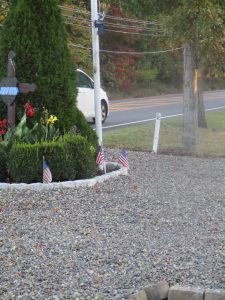BS”D
Joining the Marine [Park] Core!
An autumn plea for maintaining our sanity — or feeling disconsolate about descansos during the Month of marCheshvan
Rabbi Hillel L. Yarmove
Oh, you don’t know what a descanso is, so you don’t even begin to fathom what I’m even talking about!
“Descanso” is the Spanish word for “rest, repose.” It has also become the name for a phenomenon that is new to my generation — the roadside memorial to someone killed in an automobile accident (R”l).
Now don’t tell me that you’ve never seen them. Of course, you have. You just haven’t observed them before! I’ll bet that you never even gave a second thought to what those strange, item-laden memorials were doing by the side of the road!
Truth to tell, when I was growing up decades ago, I didn’t see them either. As a matter of fact, when I was 17 or 18 years old, even if I had seen them, I would have thought them irrelevant to my peers and me. After all, we honestly we believed we were invulnerable!
Of course, nobody ever enunciated such a preposterous idea. But I still remember that we all — well, at least most of us — drove that way. Perhaps I was an exception, perhaps not. That was then!

Now along comes the revival of an old Hispanic custom, that of setting up descansos by the side of the road. Initially, these memorials were instituted as resting places for pallbearers to lay down the coffin on their way to the cemetery. Indeed, one expert has written, “Mourners would then mark the location with flowers or wreaths to remind people to pray for the deceased. In addition, early American settlers used descansos to mark the sites where pioneers died.”
I can’t help but wonder what my contemporaries would have thought of descansos in the early ‘60s, when I began to drive. I must admit that there is something shattering about seeing wreaths and the personal effects of the deceased that slams you into reality. You begin to realize that instead of getting better, things have actually gotten a good deal worse. Because of the decaying of our infrastructure (our pothole-filled roads and structurally substandard bridges), the abundance of distractions (think “cell phone” here — although I must mention that the first ordinance in the entire world to prohibit cell-phone shmoozing while driving was enacted in Brooklyn . . . OHIO!) and ironically (as some have insisted) the descansos themselves; plus a marked increase in speed limits, we should have expected nothing less!
Hatzolah can tell you the facts and figures relating to teenage-driving accidents (R”l). As for me, I can merely shudder. For over the years I have paid attention to the driving habits of young basically inexperienced motorists — whether Jewish or not — and, generally speaking, I am appalled. As a general rule, many really do drive as though they believed themselves to be immortal. But I know better, and I’m tired of seeing so many roadside memorials, so many descansos.
It’s got to stop somewhere, somehow.
Yet we seem to have the unmitigated gall of thrusting our children’s poor driving practices (or badly maintained automobiles*) onto Hakadosh Baruch Hu! Have we asked a sha’alas chachamim about doing so?
I guess you’d have to have seen the makeshift Mogen David by the side of Palmetto Park(way) in Boca Raton, Florida, (as I did!) for this whole phenomenon to hit home. Years ago, as I was driving to daven Minchah in a shul in the vicinity, I caught a glimpse of it standing next to a small group of crosses by the side of a road (near a canal, I think!). No, I don’t know the entire story behind the frightful crash that led to these descansos, but what I was subsequently able to unearth filled me with both dread and exquisite pain on behalf of the parents of the deceased teens—no matter whose child was “at fault.”*
Consequently, what should we feel about allowing our teenagers behind the wheel of a car during the late-autumn months—when the streets may well be coated with slick, wet, slippery leaves or with a thin layer of almost-invisible ice? If they customarily behave wisely and drive prudently, fine! But if they don’t, shouldn’t we endeavor to keep such “wise guys” off the road—at all costs?
After all, we certainly don’t want the month of marCheshvan to become “mar”—bitter— because of some unfortunate mishap, Heaven forbid!
A good, safe autumn season — both in and out of our automobiles — to all Klal Yisrael!
Comments or questions? Please contact me at hillyarm@yeshivanet,com.
You must be logged in to post a comment.